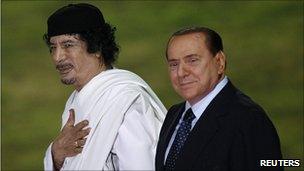 Muammar Gaddafi visited Europe for the last time in August of 2010, received in Rome with all the honours of a chief-of-state. At the time he requested five thousand million euros from the European Union to help the fight against illegal immigration. His words were peremptory: "Tomorrow Europe might no longer be European, and even black, as there are millions who want to come in".
Muammar Gaddafi visited Europe for the last time in August of 2010, received in Rome with all the honours of a chief-of-state. At the time he requested five thousand million euros from the European Union to help the fight against illegal immigration. His words were peremptory: "Tomorrow Europe might no longer be European, and even black, as there are millions who want to come in".
One year later Gaddafi would be summarily executed at the hands of an Islamic militia.
